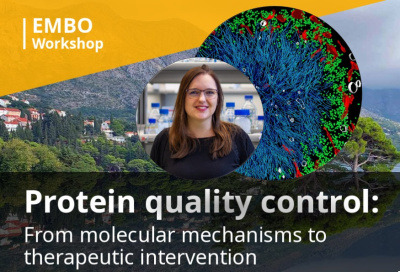
The conference ‘Protein quality control: From molecular mechanisms to aging and disease’, organised by the European Molecular Biology Organisation (EMBO), is one of the world's most important conferences on protein homeostasis. Dr Agnieszka Kłosowska from the Intercollegiate Faculty of Biotechnology UG and MUG presented the results of research conducted by a team led by prof. dr hab. Krzysztof Liberek, which concerned the functioning of chaperone proteins belonging to the Hsp70 system.
Chaperone proteins of the Hsp 70 system (heat shock proteins – more information can be found here: On chaperone proteins with 'Polish Nobel' laureate prof. Krzysztof Liberek | NEWS - Uniwersytet Gdański) prevent the accumulation of harmful aggregates created by damaged proteins in the cell. This is an important system that protects the body against diseases such as Parkinson's and Alzheimer's, and also plays a significant role in the ageing process.
‘Our team investigated how proteins from the Hsp70 system interact with each other when binding to aggregates, which translates into the efficiency of aggregate protein dissolution,’ said dr Agnieszka Kłosowska. ‘In our research, we used human and yeast proteins that we had previously produced in bacteria and purified, and then subjected to biochemical analyses, which provided us with detailed information about their mechanism of action. We have demonstrated that the formation of complex structures by the Hsp70 protein on the surface of aggregates involves the participation of the auxiliary chaperone protein JDP (J-domain protein) in a multi-step process. We described the role of individual elements of these proteins in this process, with particular emphasis on the JDP protein fragment, the so-called J domain, which can bind additional Hsp70 molecules to the already formed complex. This binding pattern is observed in both human and yeast proteins, indicating a universal, i.e. evolutionarily conserved, mechanism of the protein machinery that breaks down toxic aggregates.’
Dr Agnieszka Kłosowska presented the results of her research at the EMBO conference ‘Protein quality control: From molecular mechanisms to aging and disease’, one of the world's most important conferences on protein homeostasis, where she was awarded the prize for the best scientific poster. The event took place on 18–23 May 2025 in Hersonisos, Greece.
The research was conducted by a team from the Department of Protein Biochemistry led by prof. dr hab. Krzysztof Liberek, composed of: dr Agnieszka Kłosowska, mgr Hubert Wyszkowski, mgr Wiktoria Sztangierska, mgr Agata Konieczna, dr Maria Pokornowska, mgr Filip Kuś, as well as dr inż. Bartłomiej Tomiczek from the Department of Evolutionary Biochemistry, headed by prof. dr hab. Jarosław Marszałek.
The research project was financed by an OPUS grant led by prof. Krzysztof Liberka (OPUS 27 UMO-2024/53/B/NZ1/00632, ‘Protective protein machinery in the recovery of proteins from amorphous and fibrillar aggregates’).


